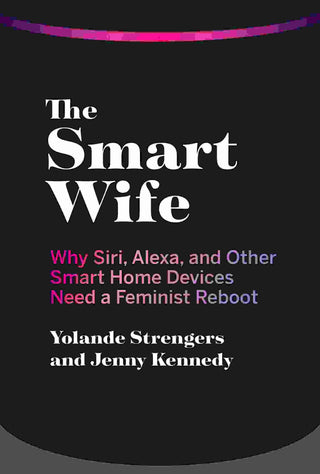The Smart Wife : Why Siri Alexa and Other Smart Home Devices Need a Feminist Reboot
- Unit price
- / per
-
Author:STRENGERS Yolande / KENNEDY Jenny
-
ISBN:9780262044370
-
Publication Date:November 2020
-
Edition:1
-
Pages:312
-
Binding:Hardback
-
Publisher:Te Herenga Waka University Press
-
Country of Publication:


A Back Order button means that we don’t have the book in stock at our store. It may already be on order – or we can order it for you from a publisher or distributor at no additional cost.
As we source items from around the globe, a back-order can take anywhere from 5 days to several weeks to arrive, depending on the title.
To check how long this might take, you’re welcome to contact us and we can provide an ETA or any other information you need. We recommend checking the timeframe before committing to an online order.
The Smart Wife : Why Siri Alexa and Other Smart Home Devices Need a Feminist Reboot
- Unit price
- / per
-
Author:STRENGERS Yolande / KENNEDY Jenny
-
ISBN:9780262044370
-
Publication Date:November 2020
-
Edition:1
-
Pages:312
-
Binding:Hardback
-
Publisher:Te Herenga Waka University Press
-
Country of Publication:
Description
Meet the Smart Wife - at your service, an eclectic collection of feminised AI, robotic, and smart devices. This digital assistant is friendly and sometimes flirty, docile and efficient, occasionally glitchy but perpetually available. She might go by Siri, or Alexa, or inhabit Google Home. She can keep us company, order groceries, vacuum the floor, turn out the lights. A Japanese digital voice assistant - a virtual anime hologram named Hikari Azuma - sends her "master" helpful messages during the day; an American sexbot named Roxxxy takes on other kinds of household chores. In The Smart Wife, Yolande Strengers and Jenny Kennedy examine the emergence of digital devices that carry out "wifework" - domestic responsibilities that have traditionally fallen to (human) wives. They show that the principal prototype for these virtual helpers - designed in male-dominated industries - is the 1950s housewife: white, middle class, heteronormative, and nurturing, with a spick-and-span home. It's time, they say, to give the Smart Wife a reboot.
Adding product to your cart
You may also like
A Back Order button means that we don’t have the book in stock at our store. It may already be on order – or we can order it for you from a publisher or distributor at no additional cost.
As we source items from around the globe, a back-order can take anywhere from 5 days to several weeks to arrive, depending on the title.
To check how long this might take, you’re welcome to contact us and we can provide an ETA or any other information you need. We recommend checking the timeframe before committing to an online order.
You may also like
You may also like
-
Meet the Smart Wife - at your service, an eclectic collection of feminised AI, robotic, and smart devices. This digital assistant is friendly and sometimes flirty, docile and efficient, occasionally glitchy but perpetually available. She might go by Siri, or Alexa, or inhabit Google Home. She can keep us company, order groceries, vacuum the floor, turn out the lights. A Japanese digital voice assistant - a virtual anime hologram named Hikari Azuma - sends her "master" helpful messages during the day; an American sexbot named Roxxxy takes on other kinds of household chores. In The Smart Wife, Yolande Strengers and Jenny Kennedy examine the emergence of digital devices that carry out "wifework" - domestic responsibilities that have traditionally fallen to (human) wives. They show that the principal prototype for these virtual helpers - designed in male-dominated industries - is the 1950s housewife: white, middle class, heteronormative, and nurturing, with a spick-and-span home. It's time, they say, to give the Smart Wife a reboot.
-
-
Author: STRENGERS Yolande / KENNEDY JennyISBN: 9780262044370Publication Date: November 2020Edition: 1Pages: 312Binding: HardbackPublisher: Te Herenga Waka University PressCountry of Publication:
Meet the Smart Wife - at your service, an eclectic collection of feminised AI, robotic, and smart devices. This digital assistant is friendly and sometimes flirty, docile and efficient, occasionally glitchy but perpetually available. She might go by Siri, or Alexa, or inhabit Google Home. She can keep us company, order groceries, vacuum the floor, turn out the lights. A Japanese digital voice assistant - a virtual anime hologram named Hikari Azuma - sends her "master" helpful messages during the day; an American sexbot named Roxxxy takes on other kinds of household chores. In The Smart Wife, Yolande Strengers and Jenny Kennedy examine the emergence of digital devices that carry out "wifework" - domestic responsibilities that have traditionally fallen to (human) wives. They show that the principal prototype for these virtual helpers - designed in male-dominated industries - is the 1950s housewife: white, middle class, heteronormative, and nurturing, with a spick-and-span home. It's time, they say, to give the Smart Wife a reboot.
-
Author: STRENGERS Yolande / KENNEDY JennyISBN: 9780262044370Publication Date: November 2020Edition: 1Pages: 312Binding: HardbackPublisher: Te Herenga Waka University PressCountry of Publication:
-



